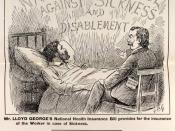At the start of the 1900s, Booth and Rowntree produced scientific surveys which revealed that Britain was facing serious poverty problems. They showed that one third of the British population were living below subsistence level and were unable to afford the basic necessities to survive. This circumstance resulted from a number of causes, often through no fault of their own, including unemployment, ill-health and old age. However, the traditional Victorian attitude to poverty was that it was self-inflicted and that if people were poor it was their own fault. The belief was that these people misspent their money and did not save up for any contingencies that may arise. Therefore, very little help was available for the poor as it was thought that they should help themselves. They were forced to depend on philanthropy or bear the terrible conditions of the workhouse, despite the stigma attached to it. The Liberals, however, made an attempt to change this when they came to power in 1906 and introduced a number of reforms such as health insurance, old age pensions and labour exchanges.
They intended to offer more suitable help to solve the problem of poverty. The aim of this essay is to examine the changes the Liberal Government made and come to a conclusion on how successful the reforms were.
According to Booth, alongside ill health, old age was one of the biggest contributing factors to poverty as 27% of the poor in London were poor due to old age. Prior to 1908 there were few options open to the elderly and as they had no or little income of their own they had to finally face the harsh conditions of the workhouse or rely on their families for support. The Liberal Government attempted to solve this problem by introducing the Old...



Well Done!!
This essay is very efficive and informal.Well done!it tells us alot about british liberal government
0 out of 0 people found this comment useful.